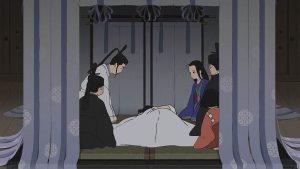 I remain quite torn about this adaptation of Heike Monogatari, if you can call it that. To see so many missteps in the long, long-overdue anime pass at this story is agonizing. Yet it is, for me quite plainly, a compelling and impactful work. I think there’s an inherent paradox at work here – to wit, those who love the original are likely to be gutted by the massive cuts and original material, while those who don’t know it will likely have only the barest understanding of what’s happening. I guess in the end it’s what we said back at the beginning – “better than nothing”.
I remain quite torn about this adaptation of Heike Monogatari, if you can call it that. To see so many missteps in the long, long-overdue anime pass at this story is agonizing. Yet it is, for me quite plainly, a compelling and impactful work. I think there’s an inherent paradox at work here – to wit, those who love the original are likely to be gutted by the massive cuts and original material, while those who don’t know it will likely have only the barest understanding of what’s happening. I guess in the end it’s what we said back at the beginning – “better than nothing”.
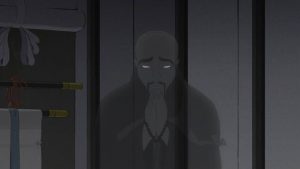 Even as I long for all the context that’s been brutally ripped away from these events, in a funny sort of way I can fill in the blanks myself and make them seem quite riveting. Take the story of Shunkan, for example – the monk at whose estate (though historians don’t universally agree it was his) the Shishigatani plot was hatched. He’s a major figure in Japanese culture – featured in Noh and Kabuki, and in modern literature – and his story was a significant part of the original book. Here he gets only a brief mention as the two men he was exiled to Kikai-ga-shima with were pardoned by Kiyomori at Shigemori’s behest, in an attempt to appease their spirits and help Tokuno through her difficult pregnancy.
Even as I long for all the context that’s been brutally ripped away from these events, in a funny sort of way I can fill in the blanks myself and make them seem quite riveting. Take the story of Shunkan, for example – the monk at whose estate (though historians don’t universally agree it was his) the Shishigatani plot was hatched. He’s a major figure in Japanese culture – featured in Noh and Kabuki, and in modern literature – and his story was a significant part of the original book. Here he gets only a brief mention as the two men he was exiled to Kikai-ga-shima with were pardoned by Kiyomori at Shigemori’s behest, in an attempt to appease their spirits and help Tokuno through her difficult pregnancy.
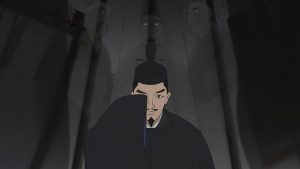 Why did Kiyomori refuse to pardon only Shunkan and not Yasuyori and Naritsune? It may have been that it was his estate used, or that Kiyomori didn’t see him as contrite enough, or there may have been other reasons. He was a member of the Minamoto clan as it happens, which at the very least is a fascinating detail about the whole affair. Of course pardoning only the two men Shunkan was exiled with was the cruelest thing Kiyomori could have done, and left Shunkan in utter despair. His story gets quite a lot more play in the book, though I’m guessing the anime is going to leave it where it lies.
Why did Kiyomori refuse to pardon only Shunkan and not Yasuyori and Naritsune? It may have been that it was his estate used, or that Kiyomori didn’t see him as contrite enough, or there may have been other reasons. He was a member of the Minamoto clan as it happens, which at the very least is a fascinating detail about the whole affair. Of course pardoning only the two men Shunkan was exiled with was the cruelest thing Kiyomori could have done, and left Shunkan in utter despair. His story gets quite a lot more play in the book, though I’m guessing the anime is going to leave it where it lies.
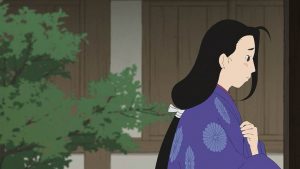 Fujiwara no Narichika, meanwhile, has died in exile (in Bizen), rendering futile Shigemori’s intervention to prevent his friend’s execution. Because of their relative positions in the court and family entanglements, this has weakened Shigemori’s power base and left him more isolated. Shigemori in fact is growing increasingly despairing about his inability to moderate his father’s impulses, and the augurs – tornadoes in the capital, the death of his daughter Moriko (who’d remained unmarried after inheriting substantial Fujiwara wealth at age 11), and of course his plot device magic eye – are grim. He heads to Kumano to pray that his own life be shortened in order to preserve if nothing else the legacy of his clan, and soon after returning takes to his sickbed.
Fujiwara no Narichika, meanwhile, has died in exile (in Bizen), rendering futile Shigemori’s intervention to prevent his friend’s execution. Because of their relative positions in the court and family entanglements, this has weakened Shigemori’s power base and left him more isolated. Shigemori in fact is growing increasingly despairing about his inability to moderate his father’s impulses, and the augurs – tornadoes in the capital, the death of his daughter Moriko (who’d remained unmarried after inheriting substantial Fujiwara wealth at age 11), and of course his plot device magic eye – are grim. He heads to Kumano to pray that his own life be shortened in order to preserve if nothing else the legacy of his clan, and soon after returning takes to his sickbed.
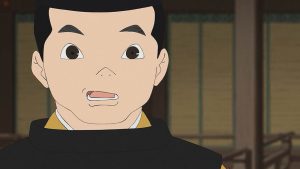 We don’t know the full truth about Taira no Shigemori’s death of course, and he lived in an age where illness and premature demise were common even among the nobility. Perhaps the story as told in the original Heike Monogatari was accurate, perhaps not – in essence, that Shigemori effectively chose to die as atonement for the sins of his father (it’s far more complicated in the book but that would take hours to summarize). What we do know is that Shigemori was widely admired even by enemies of the Taira – a truly noble man, moderate and judicious in temperament. When his end came, it came quickly – his lapsed from health into illness and died within weeks. And with him, the most realistic hope that the Heike might find a way to avert disaster.
We don’t know the full truth about Taira no Shigemori’s death of course, and he lived in an age where illness and premature demise were common even among the nobility. Perhaps the story as told in the original Heike Monogatari was accurate, perhaps not – in essence, that Shigemori effectively chose to die as atonement for the sins of his father (it’s far more complicated in the book but that would take hours to summarize). What we do know is that Shigemori was widely admired even by enemies of the Taira – a truly noble man, moderate and judicious in temperament. When his end came, it came quickly – his lapsed from health into illness and died within weeks. And with him, the most realistic hope that the Heike might find a way to avert disaster.
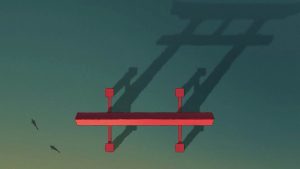 The other landmark event covered in this episode is the birth of Tokuno and Emperor Takakura’s son, the pregnancy having come to term after all. One never knows how to deal with “spoilers” when it comes to historical events, because of course if a viewer has no knowledge of those events what happens on-screen will be a surprise to them. So of this child I will speak little more for now, though there are certainly inferences in the episode as to his significance. What’s certain is that the Heike now face a future without their moral guiding light and political anchor, and kind and timid (though much less so in the book than is portrayed here) Koremori has a huge burden placed on him at far too young an age.
The other landmark event covered in this episode is the birth of Tokuno and Emperor Takakura’s son, the pregnancy having come to term after all. One never knows how to deal with “spoilers” when it comes to historical events, because of course if a viewer has no knowledge of those events what happens on-screen will be a surprise to them. So of this child I will speak little more for now, though there are certainly inferences in the episode as to his significance. What’s certain is that the Heike now face a future without their moral guiding light and political anchor, and kind and timid (though much less so in the book than is portrayed here) Koremori has a huge burden placed on him at far too young an age.
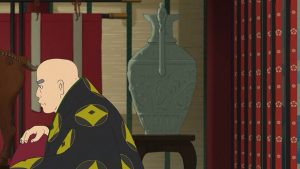 We’re at the nascent part of the story here, really. And in my view, while it’s all superlative the most poignant parts of the book are what come after the great historical events have played themselves out. I’m quite concerned the anime will give those short shrift or skip them altogether, but there’s nothing for it but to wait and hope. Biwa is clearly going to serve as the bridge to whatever happens on-screen, and I’m quite puzzled as to why she seems not to age – surely this is significant in some way, but I have no idea what Yoshida and Yamada are playing at there.
We’re at the nascent part of the story here, really. And in my view, while it’s all superlative the most poignant parts of the book are what come after the great historical events have played themselves out. I’m quite concerned the anime will give those short shrift or skip them altogether, but there’s nothing for it but to wait and hope. Biwa is clearly going to serve as the bridge to whatever happens on-screen, and I’m quite puzzled as to why she seems not to age – surely this is significant in some way, but I have no idea what Yoshida and Yamada are playing at there.


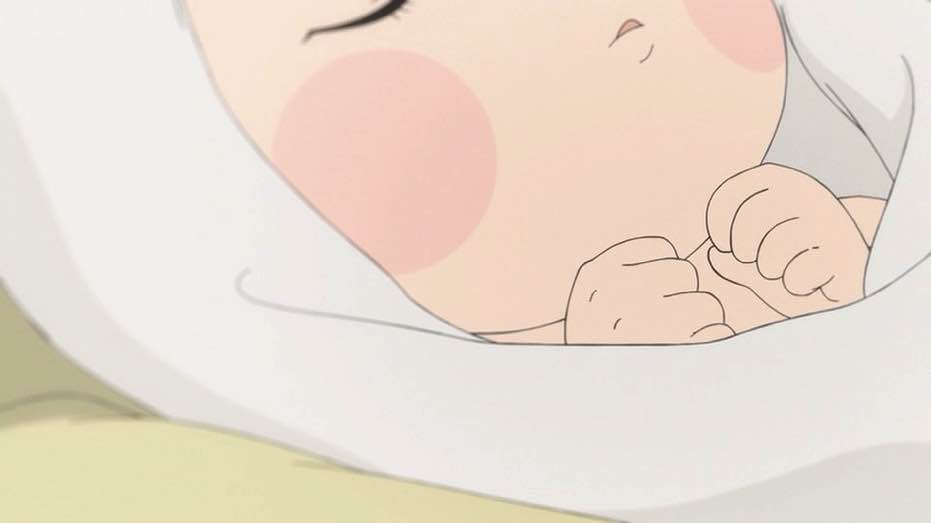
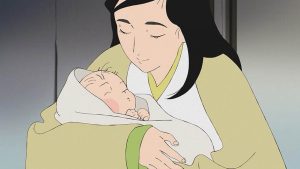
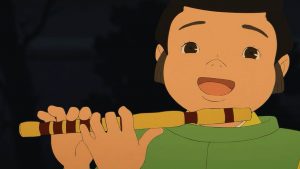
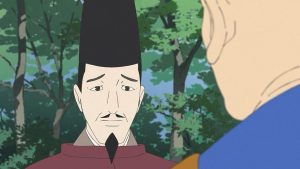
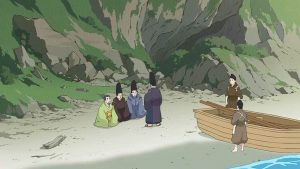
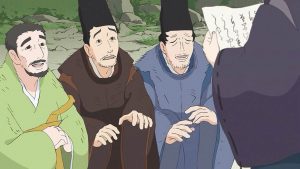
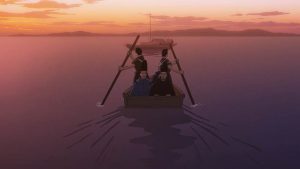
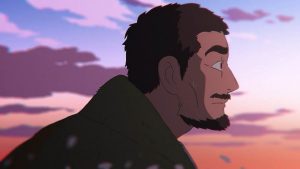
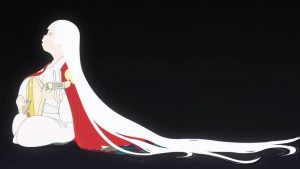
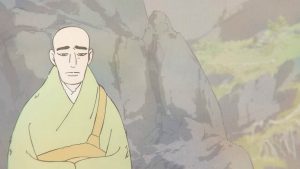
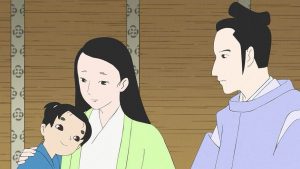
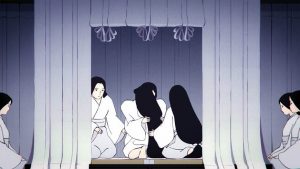
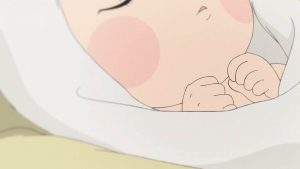
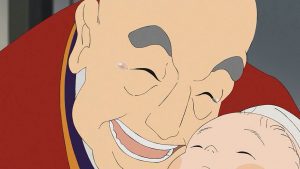
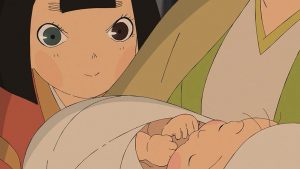
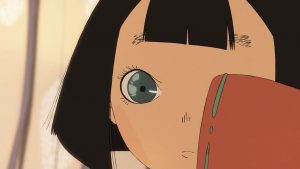
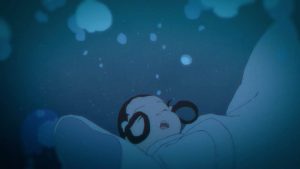
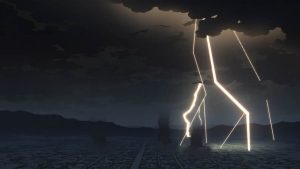
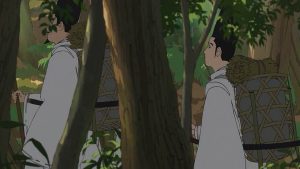
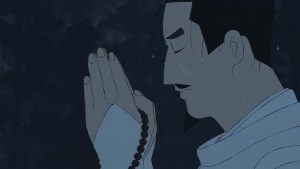
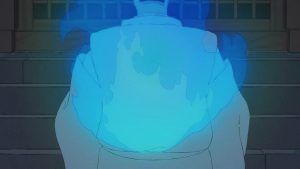
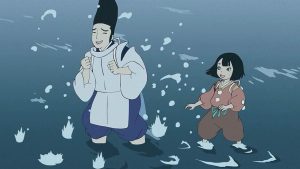
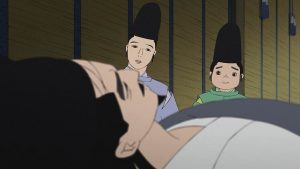
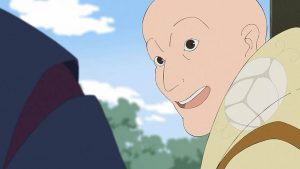
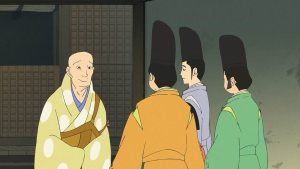
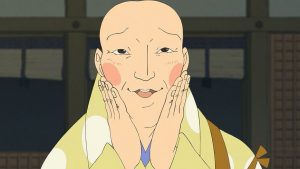
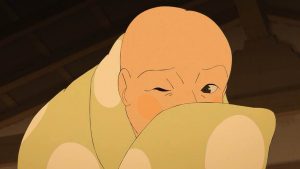
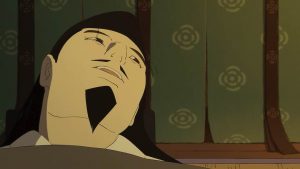
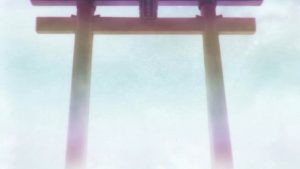
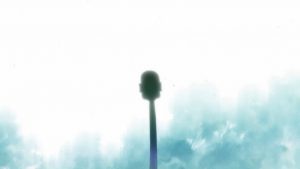
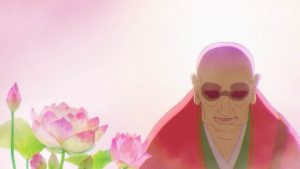
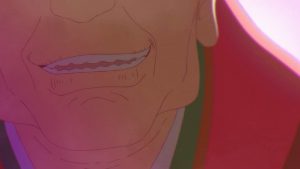
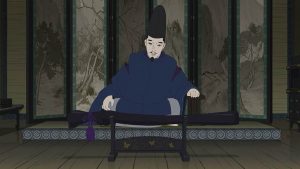
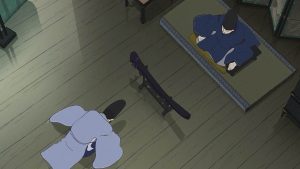
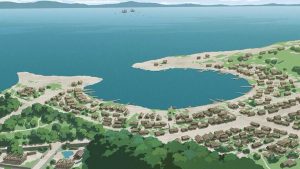
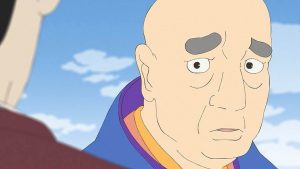
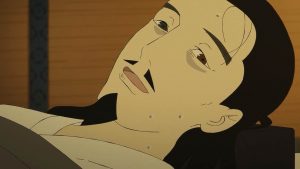
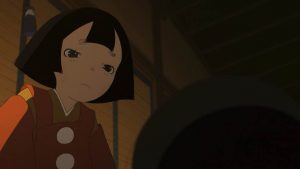
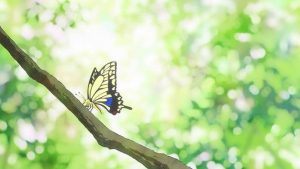
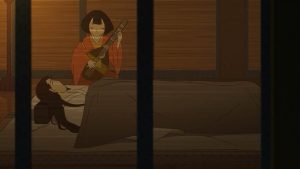
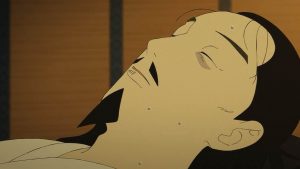
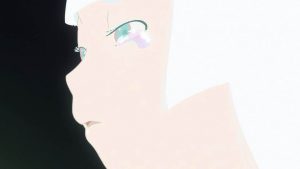
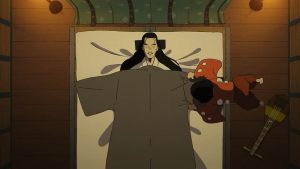
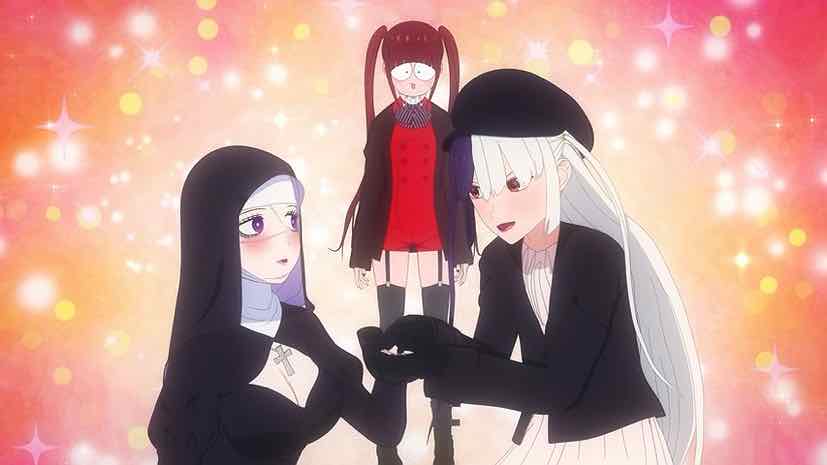
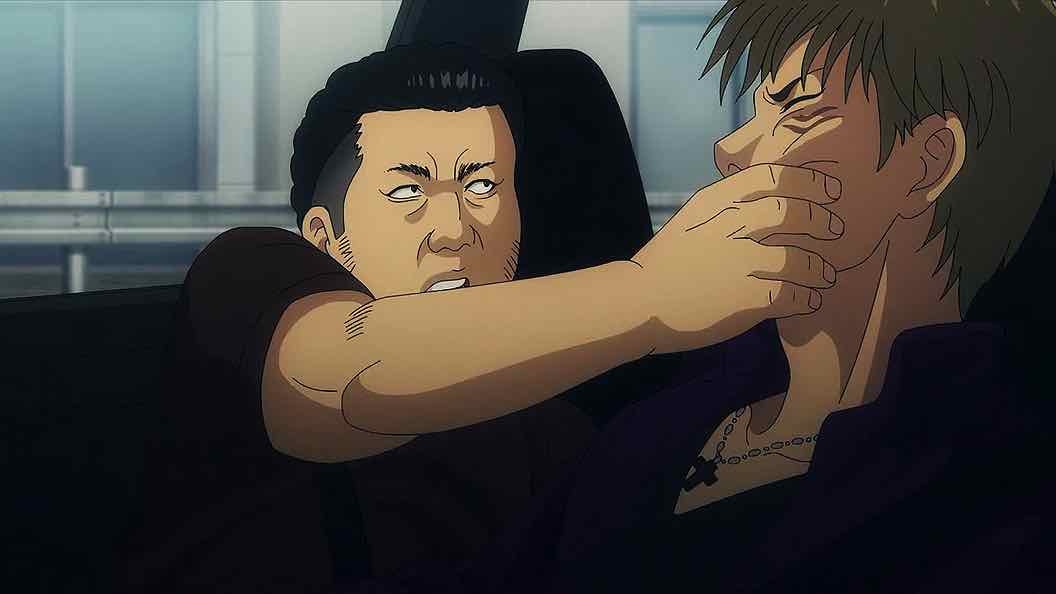
BBOvenGuy
October 8, 2021 at 12:02 pmI think you’re making too much of the aging thing. Some young women are just short and not very curvy, and anime tends to exaggerate that. Case in point: Which of the characters in this image is the oldest? And the fact that Biwa wears men’s clothing isn’t going to make her look any more womanly.
Guardian Enzo
October 8, 2021 at 1:25 pmDude, she hasn’t aged a day.